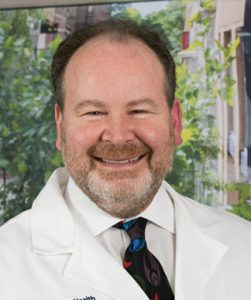From primary care doctors to bariatric surgeons, physicians are sounding the alarm: There’s an underlying health crisis within the Covid-19 pandemic, they say – and it’s one no one wants to talk about.

Greg Taylor, DO
More than 40 percent of Americans gained, on average, almost 30 pounds since the pandemic started, according to a study by the American Psychological Association. Five pounds is something people may complain about. But 30? That’s when people start to hide their weight gain under loose clothing, at least until it starts affecting their health, says Greg Taylor, DO, medical director of Cooper Care Alliance.
“As a primary care physician, I don’t typically see most people often – usually only once or twice a year,” says Taylor. “It’s a long period of time, and you can gain a significant amount of weight in a year if you’re not careful. Since 2020, we’ve really noticed a big uptick in weight gain across the board.”
That gain, he says, has 3 major contributing factors.
“When everything shut down, we increased calorie intake as people started ordering in more and stress eating. Even when we did cook, it was often baked goods and comfort foods,” says Taylor. “Stress had a big role – we saw a big increase in depression and anxiety, which can mess with your cortisol levels and manifest physically as weight gain. Then, people stopped working out as much. We weren’t leaving the house, walking through parking lots like we used to, taking stairs like we used to.”
We’re far from the dark days of lockdown, he says, but even though people aren’t actively gaining weight like they were at the beginning of the pandemic, they’re having a hard time shedding those extra pounds.
Sometimes, he says, weight management just means adjusting your habits to the new circumstances. “If you used to walk up the stairs to work and now you work from home, get out on a 10-minute walk during your conference calls,” he says.

Rebecca Fraid, DO
Creating a routine in our new normal is the most important thing you can do because the effects of the extra pounds can show up in a number of different health complications, says Rebecca Fraid, DO, a family medicine specialist at Inspira.
“We’re seeing changes in sugar levels, liver enzymes, cholesterol,” says Fraid, who is trained in obesity medicine. “Even people who never snored before now are because of weight gain, and it can mean sleep apnea.”
But most concerning, she says, is when the weight gain creates added complications when a patient gets Covid.
“So many side effects stick around after patients recover, like fatigue and brain fog,” she says. “People, whether they were healthy before or not, can develop Covid pneumonia that leaves them struggling to breathe. I have marathon-runner patients who aren’t able to do even a third of what they did pre-Covid. They can recover enough to go to work but have no energy left to work out at the end of the day. All of that can lead to additional weight gain.”
And that’s one of the better scenarios, she says, noting that some 78 percent of people hospitalized from Covid are obese. “When you suffer from obesity or are just overweight, you already have a lot of inflammation in your body, so it makes it harder to fight off certain viruses and bacteria,” she says. “It can lead to heart attacks, blood clots, strokes and increased risk of being put on a ventilator.”
It’s well-documented that Covid and obesity are a dangerous combination, agrees Marc Neff, MD, bariatric surgery director at Jefferson Health – New Jersey.
“Pulmonary function is compromised,” he says. “Patients may have diabetes, which impairs their ability to fight infection. There are even some questions now about Covid getting stored in the fat tissue.”
One of the problems that lead people to such serious complications is the stigma associated with getting help for weight gain.

Marc Neff, MD
“There’s a tremendous, tremendous stigma with weight gain,” says Neff. “During Covid, it was not something people wanted to discuss – so many were gaining weight in secret. But it is so important for people to know that there are medications and treatments available to help with weight loss.”
“In fact,” he adds, “we’ve known since 1990 that bariatric surgery is superior to any non-operative form of therapy, but people don’t immediately seek the help they need because of discrimination.”
Already, 30 percent of the country qualifies for weight management medication or surgical treatment like sleeve gastrectomy, gastric bypass and adjustable gastric banding because of their body mass index (BMI).
“People shouldn’t be ashamed to look at their surgical options,” says Neff. “Choosing bariatric surgery isn’t an easy way out – far from it. It’s a way to get help that’s healthy and sustainable.”
But whether your Covid weight gain was just a couple extra pounds or a push over the line into obesity, you should talk to your doctors about ways to handle it.
“Hospitals are still open for business,” says Neff. “If the number on the scale is going up, talk to your medical provider about it because there are ways to help. I help through surgery, but your primary care physician can also see if there are any underlying medical issues contributing to the weight gain or even just help create goals for nutrition and exercise to get you back to where you want to be.”
“Your best chance of surviving this pandemic,” he says, “is keeping control of your health.”














